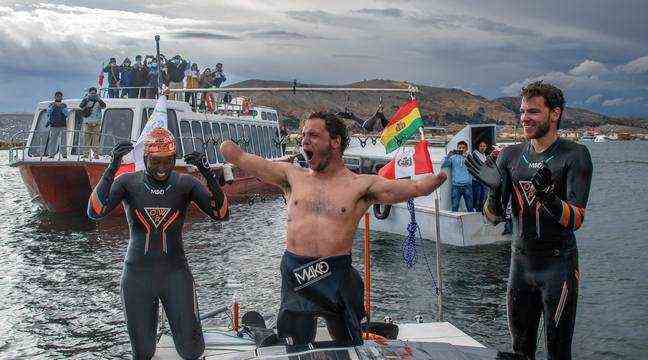Champagne awaited them in Puno (Peru). After more than ten days of swimming in very difficult weather conditions, Théo Curin, Malia Metella and Matthieu Witvoet were entitled to a triumphant welcome on Sunday, when they wrapped up their
Titicaca challenge. Launched on November 10 from Copacabana Bay (Bolivia), it was breathtaking: swim 122 km on the formidable Lake Titicaca, located at an altitude of 3,800 m, all while towing a 450 kg boat. At the origin of this crazy and unprecedented project, to which 20 minutes had devoted an episode of the off-field section, the young Paralympic athlete Theo Curin achieved his dream, alongside the Olympic swimming vice-champion Malia Metella and the eco-adventurer Matthieu Witvoet.
The trio did not hide their emotion when they arrived, after a year of intense preparation to get used to the cold and the altitude. “I am relieved that this challenge is over because it has put me face to face with certain difficulties that I absolutely did not suspect, says Theo (21), a four limbs amputated after a lightning meningitis at the age of 6 years. . I am very proud that with Malia and Matthieu, we are the first to have crossed this lake in total autonomy. “
“Nobody told us that the Titicaca was a sea”
Exhausted after having to face from the first day of their challenge to an explosive cocktail of wind, rain, hail and thunderstorm, the three swimmers constantly adapted to overcome moments of doubt, discouragement, fear and of course extreme fatigue. “Nobody told us that Titicaca was not a lake but a sea,” smiles Malia Metella. We still managed to get through three storms. When I joined Puno, I thought it was an Olympic finish. It was like the day I hit the wall at the Games [en 2004], and that I saw that I was Olympic vice-champion. In fact, I do not really have the words because this adventure was so magical with two fantastic people. “
As expected, the challenge Titicaca handed over his boat, the “Pachamama”, to the Research Institute for Development (IRD), and its partners from the University of La Paz (Bolivia), who will thus be able to use it as part of their research missions on Lake Titicaca. A strong environmental dimension accompanied the enormous sporting challenge from the start, and the raft will help local associations to put in place concrete actions to fight against pollution. Say, it may have come time to rest Theo, Malia and Matthew, right?

